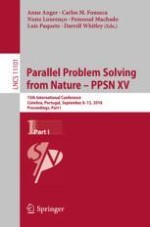2018 | OriginalPaper | Buchkapitel
Use of Two Reference Points in Hypervolume-Based Evolutionary Multiobjective Optimization Algorithms
verfasst von : Hisao Ishibuchi, Ryo Imada, Naoki Masuyama, Yusuke Nojima
Erschienen in: Parallel Problem Solving from Nature – PPSN XV
Aktivieren Sie unsere intelligente Suche, um passende Fachinhalte oder Patente zu finden.
Wählen Sie Textabschnitte aus um mit Künstlicher Intelligenz passenden Patente zu finden. powered by
Markieren Sie Textabschnitte, um KI-gestützt weitere passende Inhalte zu finden. powered by
